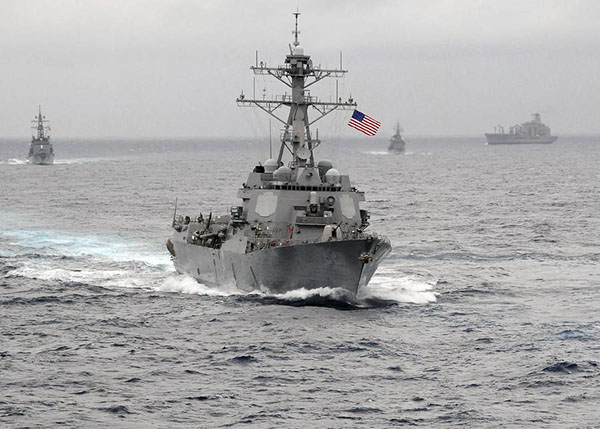

 |
| The US Navy guided-missile destroyer USS Lassen sails in the Pacific Ocean in a November 2009 photo provided by the US Navy. [Photo/Agencies] |
Lately the U.S. has been making moves in the South China Sea. USS Lassen illegally entered waters within 12 nautical miles of Zhubi Reef, which is part of China's Nansha Islands, without the permission of the Chinese government; U.S. Defense Secretary Ashton Carter visited a U.S. aircraft carrier in the South China Sea. Those muscle-flexing moves indicate the U.S. is intimidating China with its military power.
Meanwhile, U.S. Department of State has repeatedly made “noises” on South China Sea disputes. Speaking at Asia Society on Nov. 4 in New York, Daniel Russell, Assistant Secretary of State for East Asia and the Pacific, made indiscreet remarks on the South China Sea disputes. The U.S. has repeatedly accused China of "harming navigational freedom" and caused tension in this area. The U.S. tried to push China to accept international arbitration lodged by the Philippines. It is clear that the U.S. spares no efforts to scramble for more say.
It seems the U.S. is resorting to a carrot-and-stick policy, but in fact such aggressive approach can’t conceal its anxiety.
The U.S. cannot change history no matter what troubles it makes in the South China Sea. China’s sovereignty in the South China Sea has historical and legal grounding. None can deny the fact that the Chinese government has been taking actions to defend the sovereignty. The U.S. is unable to cover some countries’ illegal impairment of Chinese sovereignty.
The U.S. cannot prevent China from defending its rights. China is resolute and able to defend its sovereign and security and cope with the provocation of other counties.
The U.S. cannot prevent China from conducting effective communication with other countries. Chinese President Xi Jinping has just wrapped up his state visits to Vietnam and Singapore. Vietnam is one of the concerning parties of the South China Sea disputes. The two counties have agreed to solve the disputes through friendly consultation. Singapore, which plays a vital role in ASEAN, agrees to solve the South China Sea disputes in the light of the Declaration on the Conduct of Parties in the South China Sea.
The U.S. should clearly understand that any groundless accusation cannot hold water. It would cause troubles to itself if it makes troubles in the South China Sea.
This article was edited and translated from 《南海本无事,美国自扰之(望海楼)》, source: People’s Daily Overseas Edition, author: Hua Yisheng
 Cats who immediately regretted their life choices in photographs
Cats who immediately regretted their life choices in photographs Beautiful girl from police college becomes Internet hit
Beautiful girl from police college becomes Internet hit 10 tons of copper coins unearthed in 2,000-yr old tomb
10 tons of copper coins unearthed in 2,000-yr old tomb In Pics: Amazing Chinese fighters
In Pics: Amazing Chinese fighters
 When a Chinese woman marries an Indian man
When a Chinese woman marries an Indian man Love beyond limit of heights in the world
Love beyond limit of heights in the world
 Photos of beautiful teacher hit the Internet
Photos of beautiful teacher hit the Internet Transparent Over-cliff Path Cracked Suddenly
Transparent Over-cliff Path Cracked Suddenly Russian helicopter lands safely after being attacked in Syria
Russian helicopter lands safely after being attacked in Syria Top 20 hottest women in the world in 2014
Top 20 hottest women in the world in 2014 Top 10 hardest languages to learn
Top 10 hardest languages to learn 10 Chinese female stars with most beautiful faces
10 Chinese female stars with most beautiful faces China’s Top 10 Unique Bridges, Highways and Roads
China’s Top 10 Unique Bridges, Highways and Roads Miner threat
Miner threat Dawn of a golden age
Dawn of a golden age Xiaomi seeks foothold in Africa
Xiaomi seeks foothold in Africa Power shift won’t hurt Sino-Myanmese ties
Power shift won’t hurt Sino-Myanmese tiesDay|Week